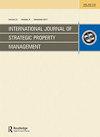尼日利亚石油和天然气公司的自我效能和可持续性
IF 1.7
4区 管理学
Q3 MANAGEMENT
International Journal of Strategic Property Management
Pub Date : 2023-07-11
DOI:10.53819/81018102t4173
引用次数: 0
摘要
本研究考察了尼日利亚石油和天然气公司的自我效能与可持续性之间的关系。本研究在变量调查中采用了横断面调查法。数据的主要来源是通过结构化问卷。研究对象为11家在尼日利亚交易所集团上市的本土石油和天然气公司。由于研究人口较少,因此采用整个人口作为人口普查。因此,尼日利亚11家本土石油和天然气公司的全部人口被作为人口普查。然而,该研究的受访者/参与者是尼日利亚11家本土石油和天然气公司的264名经理。本研究仪器经导师审核通过,采用Cronbach Alpha系数,所有项目得分均在0.70以上,实现了仪器的信度。采用Spearman秩序相关系数对假设进行检验。研究结果表明,自我效能感与尼日利亚石油和天然气公司的可持续性之间存在显著关系。在此基础上,本研究得出自我效能感分别与经济、社会和环境可持续性相关的结论。关键词:自我效能感,可持续性,经济可持续性,社会可持续性,环境可持续性本文章由计算机程序翻译,如有差异,请以英文原文为准。
Self-Efficacy and Sustainability of Oil and Gas Companies in Nigeria
This study examined the relationship between self-efficacy and sustainability of oil and gas companies in Nigeria. The study adopted the cross-sectional survey in its investigation of the variables. Primary source of data was generated through structured questionnaire. The population of the study was eleven (11) indigenous oil and gas companies quoted in Nigeria Exchange Group. The entire population was adopted as a census since the study population was small. Hence, the entire population of 11 indigenous oil and gas companies in Nigeria were adopted as a census. However, the respondents/ participants in the study were two hundred and sixty-four (264) Managers of the 11 indigenous oil and gas companies in Nigeria. The research instrument was validated by my supervisors vetting and approval while the reliability of the instrument was achieved by the use of the Cronbach Alpha coefficient with all the items scoring above 0.70. The hypotheses were tested using the Spearman’s Rank Order Correlation Coefficient. The findings revealed that there is a significant relationship between self- efficacy and sustainability of oil and gas companies in Nigeria. Based on the finding, the study concludes that self-efficacy correlates with economic, social and environmental sustainability respectively. Keyword: Self-Efficacy, Sustainability, Economic Sustainability, Social Sustainability, Environmental Sustainability
求助全文
通过发布文献求助,成功后即可免费获取论文全文。
去求助
来源期刊
CiteScore
4.00
自引率
18.50%
发文量
23
审稿时长
15 weeks
期刊介绍:
International Journal of Strategic Property Management is a peer-reviewed, interdisciplinary journal which publishes original research papers. The journal provides a forum for discussion and debate relating to all areas of strategic property management. Topics include, but are not limited to, the following: asset management, facilities management, property policy, budgeting and financial controls, enhancing residential property value, marketing and leasing, risk management, real estate valuation and investment, innovations in residential management, housing finance, sustainability and housing development, applications, etc.

 求助内容:
求助内容: 应助结果提醒方式:
应助结果提醒方式:


